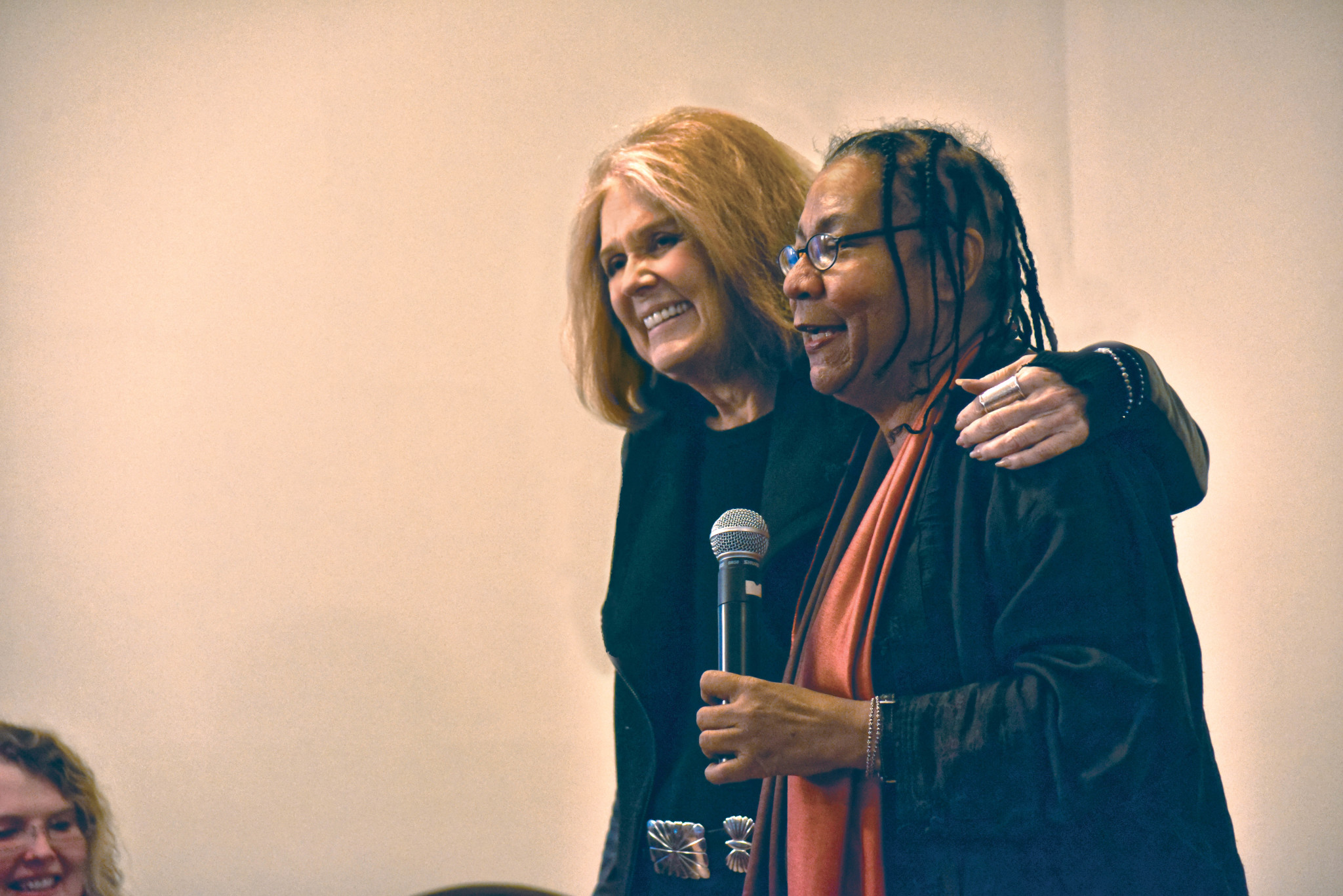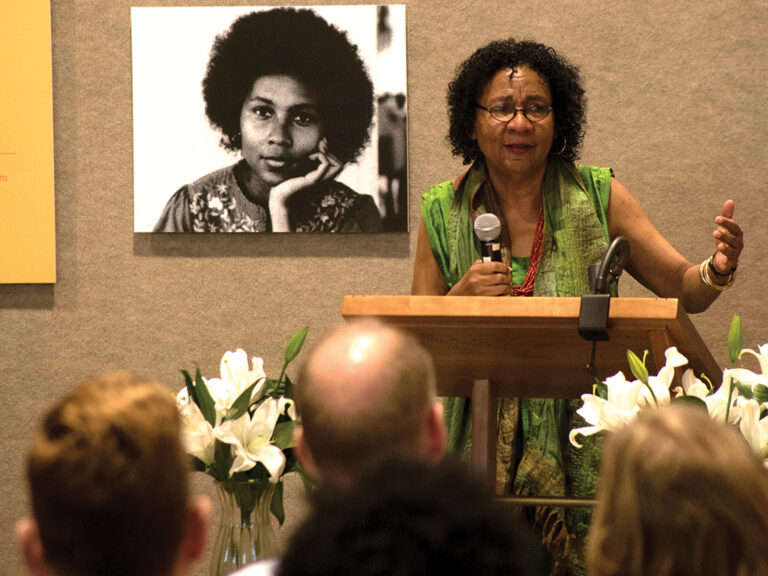
More than 10 years ago when I told my New York-based friend and feminist comrade Gloria Steinem that I would be leaving the city to move to a small town in Kentucky, she emphatically asked (in the voice of “You must be out of your mind!”), “Who will be your friends?” Although it was not her intent, these words conjured stereotypical images of Kentucky – tin can trailer parks, poor white trash rednecks, broken down pickup trucks, dirty, uneducated folks – black and white – and even more profoundly the absence of any progressive face. It is just these negative images of Kentucky that I had left behind. At no point when I made the transition from world-class big city living to quaint small town Kentucky did I ponder the issue of friendship. Having moved many places, I have learned from life that interesting, fascinating, caring folk are everywhere – that it’s possible to make a friend anywhere.
After all, Gloria and I had found each other, meeting at a photo shoot for the 1993 “No, Feminists Don’t All Think Alike” cover of Ms. Magazine. I arrived at the shoot, straight from a small town in Maine where I had been speaking and had fallen down a hill and broken bones in my hand. Coming from fishing, the surgeon at the small, local hospital put the bones back together. I carried away on my arm an elegant purple cast. My arm had to rest on a tall stool, hidden out of sight throughout the photo shoot, which included the up and coming young feminist writer Naomi Wolf, lesbian activist Urvashi Vaid, and the senior woman in our group, Gloria Steinem. She told funny stories, working really hard to make us feel comfortable. As we prepared to leave one another, Gloria fretted that I would have difficulty dressing myself with one arm unless I had the right clothes. A fashion queen, then and always, she was convinced she knew just what I could wear – requesting that I jot down my address so she could make sure I had just the clothes I needed.
I traveled home pleased with the shoot, pleased with the women I had met. Still I was surprised when Gloria’s package arrived. I had simply assumed she would forget all about her promise to me. Like the elephants she loves so much, I came to understand that Gloria does not forget. That at her core, she is a woman of her word, a woman of integrity. And so our friendship began.
In those days, we were much more likeminded then it came to the issue of fashion then we were about feminism. I saw Gloria Steinem as an old-style reformist feminist, concerned with women gaining equality with men. Almost 20 years younger, I saw myself as a member of an emerging feminist force that was not as concerned with issues of equality. We wanted to challenge and change patriarchy. We were fierce and militant. However, our differences did not stand in the way of sisterly bonding.
Unlike many white women who never talked about race, or talked but failed to understand race and racism, Gloria had protested alongside powerful black women activists – Florynce Kennedy and Margaret Sloan – to name a few. When the issue was the intersections of race, class and gender, Gloria had been well-tutored and she had learned. From the very first moment I met Gloria and on through years of friendship, she has always worked to embody anti-racist ethics, a spirit of justice that knows no hierarchy. As our solidarity has deepened, so has my profound respect for the example she sets.
Coming home to Kentucky heightened my awareness that in the world beyond most people thought feminism and Kentucky womanhood did and do not fit. And yet, I know my feminist independence was honed here, in this state. Making my home here, I began to dream of creating a center that would call attention to the influence of Kentucky on my intellectual and political life, on my work as a feminist. And so the foundations of the bell hooks Institute were laid.
The core vision was rooted in education as the practice of freedom – teaching and learning both in and out of academic settings. A child raised in the Kentucky hills, I came to Berea with a keen understanding of the need for greater literacy in our state. When Gloria Steinem first came to Berea four years ago, a diverse group of women gathered in these Kentucky hills. Women came long distances, from hills and hollows. Our years were teens to 80, and together we shared the powerful influence Steinem and her work had on our beings – lives changed, lives transformed. The emphasis she placed on self-actualization in her book, Revolution from Within, was especially inspiring to mountain women, as many of these folks had never sat in a college classroom. Later that same day, Gloria and I gave our first of what would become many public conversations. Our campus, our community came out – a packed audience – eager to hear a fabulous feminist discussion.
After Steinem’s visit, it was clear that the center needed to have a base in town, where more students could attend events, where more folks without transportation could come. When the huge brick house on Center Street was for sale, I saw clearly that it was the perfect location for the bell hooks Institute – one that would provide a place where learning conversations could happen with academic folks, the local community and scholars and thinkers from inside and outside Kentucky. In this inaugural year of the bell hooks Institute, it seemed more than appropriate for Gloria Steinem to return and grace the new building with her presence. Traveling here (during the already packed book tour for her new work, My Life on the Road), Gloria encountered friends and comrades and met many new faces. After a public conversation in which we both reiterated that efforts to challenge and change patriarchy are as needed today as in the past, Gloria spent an evening in personal conversation with Berea scholars and community folk. Her presence here, the work she did was the perfect embodiment of Berea’s dream for the bell hooks Institute. She has attained the tender age of 81, but we anticipate years from now that Gloria will return to our beloved community as bell and the bell hooks Institute are here to stay.



[…] She was born in Hopkinsville, Kentucky, in 1952, when the town was still segregated. In 2016, hooks wrote that when her dear friend Gloria Steinem had asked her why she was returning to Kentucky, she […]
[…] She was born in Hopkinsville, Kentucky, in 1952, when the town was still segregated. In 2016, hooks wrote that when her dear friend Gloria Steinem had asked her why she was returning to Kentucky, she […]
[…] She was born in Hopkinsville, Kentucky, in 1952, when the town was still segregated. In 2016, hooks wrote that when her dear friend Gloria Steinem had asked her why she was returning to Kentucky, she […]
[…] She was born in Hopkinsville, Kentucky, in 1952, when the town was still segregated. In 2016, hooks wrote that when her dear friend Gloria Steinem had asked her why she was returning to Kentucky, she […]
[…] She was born in Hopkinsville, Kentucky, in 1952, when the town was still segregated. In 2016, hooks wrote that when her dear friend Gloria Steinem had asked her why she was returning to Kentucky, she […]
[…] She was born in Hopkinsville, Kentucky, in 1952, when the town was still segregated. In 2016, hooks wrote that when her dear friend Gloria Steinem had asked her why she was returning to Kentucky, she […]
[…] She was born in Hopkinsville, Kentucky, in 1952, when the town was still segregated. In 2016, hooks wrote that when her dear friend Gloria Steinem had asked her why she was returning to Kentucky, she […]
[…] She was born in Hopkinsville, Kentucky, in 1952, when the town was still segregated. In 2016, hooks wrote that when her dear friend Gloria Steinem had asked her why she was returning to Kentucky, she […]
[…] She was born in Hopkinsville, Kentucky, in 1952, when the town was still segregated. In 2016, hooks wrote that when her dear friend Gloria Steinem had asked her why she was returning to Kentucky, she […]
[…] She was born in Hopkinsville, Kentucky, in 1952, when the town was still segregated. In 2016, hooks wrote that when her dear friend Gloria Steinem had asked her why she was returning to Kentucky, she […]
[…] words.She was born in Hopkinsville, Kentucky, in 1952, when the town was still segregated. In 2016, hooks wrote that when her dear friend Gloria Steinem had asked her why she was returning to Kentucky, she […]
[…] words. She was born in Hopkinsville, Kentucky, in 1952, when the town was still segregated. In 2016, hooks wrote that when her dear friend Gloria Steinem had asked her why she was returning to Kentucky, she […]